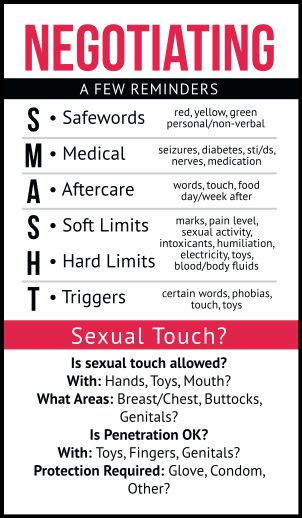What are negotiations?
Simply put, negotiation is a process by which people plan an activity (like a scene) or a relationship by discussing what is consented to and what is not, to establish mutually agreed upon boundaries and behavior.
Scene Negotiation
Just as it sounds, negotiating a scene is about discovering what you and others would like to do during a specific time in a specific place together.
What do you consent to?
What do you specifically NOT consent to?
In scene negotiation, there are usually two styles. Additive and subtractive.
I promise we won’t be doing math, and there will NOT be a test. These are more about HOW you negotiate.
Additive. In additive negotiations, you negotiate what MAY happen. Anything not negotiated and agreed to is off the table.
This is generally considered the best negotiation method for beginners, and the safest.
- ONLY the activities you discuss are allowed.
- ONLY the toys you approve are allowed.
- ONLY the behaviors you agree to are allowed.
And so on.
Subtractive. Subtractive negotiations are more versatile. The idea here is to give a general scene type (impact play), then to remove activities, toys and behaviors that you do not agree to.
For example, you want an impact play scene, and you withdraw consent for the bullwhip (ouch!) and discuss your limits.
Of course, that leaves the scene open to a LOT of other options, which will have to be managed in-scene.
Some people might be excellent and have experience at communicating in-scene. Others might find themselves in a head space that makes this difficult to do.

Safe words. Of course safe words can help—and are valuable regardless of the style of negotiating or play you might do.
Like the image above, you might choose a specific safe word that is meaningful to you.
Or, you might use the traffic light system:
Green: Go! I love it!
Yellow: Caution. Slow down or stop for a moment. Something is not perfect.
Red: Stop. Stop now. Stop the scene. Danger!
Safe words are most often used in situations where kink is happening because they are easy to listen for.
They were created for the purpose of allowing people to struggle, scream expletives (“Fuck you, sadist!” is not a safeword, unless you negotiate it), and even say “No,” “Don’t,” or “Stop,” without actually stopping the scene.
Not everyone uses safewords.
And that’s OK.
Some people do not say “No” or “Stop” unless they mean it. In that case, using plain English is fine.
However, that should be discussed and negotiated, so there is no confusion with your partner(s).
On the back of our cards at Dating Kinky, we include a handy tip sheet to help with scene negotiations:

Jay Wiseman has an article and some ideas to help you out here as well.
Relationship Negotiation
It’s important to note that relationship negotiation is generally not a one-and-done thing. It’s a progression over time, building new layers and complexity on top of previously agreed-upon topics.
I have long believed that the art of relationship negotiation should be taught to everyone.
In kink, it’s discussed quite a bit, especially in regards to creating contracts. However, even then, often parts of the relationship are left out, as we are conditioned by society to believe that the “right relationships” “just happen,” and love conquers all.
One of my favorite quotes is:
She did observe, with some dismay, that far from conquering all, love lazily sidestepped practical problems.
— Jean Stafford
Thing is, we have a tendency to ASSUME that others, especially those we love, think like us.
Which leads us in kinky relationships to precisely the expected amount of trouble and then some.
Those assumptions and how we act on them without thinking or negotiating with our partners are commonly referred to as covert contracts.
Covert Contracts Are Ruining Your Relationship(s)!
Do you feel resentment in your relationship(s)?
Do you feel burdened?
I’m not talking about kids and work and having to do laundry (just not the folding, please!!!). I’m talking about feeling burdened by the things you have to do to keep the relationship going.
Do you?
That’s a sure sign that you have entered into a covert contract with your other(s), and that’s never a good thing.
What’s a covert contract?
A covert contract is an agreement that you believe exists, even if you’ve not actually communicated it to your partner, and gotten their consent.
How about some examples?
- You do the dishes (when you don’t normally), so your partner won’t complain about the game.
- You take your partner out for Valentine’s Day, so you expect sex.
- You keep the house clean in order to get recognition.
- You give up sex to get more affection.
- You agree to see THAT movie in the hopes that next time you’ll both/all get to see yours.
NONE of these are bad, except… when you don’t communicate them.
An easy way to recognize a covert contract:
Whenever you’re in an argument, and you want to bring up all the things you do for the other person, to point them out, because you feel that they have missed them.
Some say…
That those who enter into covert contracts are acting entitled.
Hell. I’ve said that.
To be fair, though, it’s not always exactly true. Many times, it’s just more “misguided,” because most of us are never taught how to communicate or negotiate in relationships at all, much less kinky ones.
It’s not that they think they should get things handed to them.
It’s just that they often think, “Well, if someone did this for me, I would respond this way.”
And voila!
A covert contract is born.
This is why the Golden Rule—treat everyone as you would like to be treated—is misleading, and the Platinum Rule—treat everyone as they would like to be treated—is more informing, as it encourages you to ask, “Hey, how would you like to be treated?”
Here’s how to avoid covert contracts…
Using the examples I gave above:
“Hey, I’d like to watch the game this evening. I know you like to relax after cleaning up. How about I do the dishes, and you can relax in a bubble bath/in the garage with your car tinkering while I cheer for my team? I’ll check on you during the commercial breaks to see if you need anything.”
OR, better yet:“
I’d really love to watch the game tonight. Is there anything I can do for you, or help with that will make your night better?”
“So, I’ve got this amazing dinner planned, and all night, I’ll be doing my best to rev your engine for some amazing hot sex after. Any requests?”
OR, better yet:
“I’d really love to be intimate tonight, and it seems we’ve been out of sync lately. What would you like me to do, to make you feel amazing and loved and in the mood?”
“I’ve been doing an amazing job on the house lately, and it seems you haven’t really noticed. Could you plan a nice date night for me, to show me how much you appreciate my efforts?”
OR, better yet:
“I’d really love to get some affection and appreciation for the things I do around the house. I know we’ve both been crazy busy. Perhaps we can plan a date night for each other to relax and connect. What do you think?”
“I’d really like some cuddle time. How about tonight, we cuddle while we watch _, and you can say sweet things to me, and after we’ll have amazing sex?”
OR, better yet:
“I need some physical affection without sex. Can you give me lots of pets and hugs and such all night tonight?”
“_______ isn’t my first choice, but I’ll see it with you. Next week, let’s see my choice, ______, on date night.”
OR, better yet:
Actually, that one is pretty good, LOL!
Now, you may not like any of these options, and that’s cool. The point is that you have to actually SPEAK the words to your partner for them to know what you want.
Otherwise, you’re busy fulfilling your side of a contract that the other party doesn’t even know exists.
On the other side of things…
If you feel awe and wonder and pure happiness and joy and thankfulness to be where you are, able to to the things that you do for your partner, you are not in a covert contract.
Sometimes the shift is subtle, so you must be absolutely honest with yourself, so you don’t let covert contracts ruin your relationship(s).
Kinky Relationship Negotiation, Part Deux
So, now you know what not to do, but what do you do to negotiate a kinky relationship?
Communicate.
Talk with each other about your relationship and what you want it to look like.
Talk about:
Sex. How often? What kind? Limits? Birth control or health issues?
Arguments. How do you defuse an argument? Do you want to create “fighting fair” rules? Does either of you get the ability to veto or end an argument? How do you ask for time to cool down?
Loyalty. What does loyalty mean to you? Are you monogamous? Poly? Open? Swingers? How do you plan to interact with others in play, sex and love, if at all? Do you have agreements you’d like to make?
Finances. How do you handle money? Do you share it, or keep separate accounts? Do you move in or buy a home together? Who’s in charge of major decisions? What can be done without discussion, what needs buy-in from everyone in the relationship? How do you save?
Appreciation. What makes each of you feel loved and appreciated? The Five Love Languages is a good place to start, if you don’t even know where to begin with this.
Children. Will you have them? How do you make parenting decisions? Do you both have ideas about how to raise them? What decisions need to be made together, and which are OK to make on the fly?
Specialized Skills. Who knows things the other doesn’t? Who might be in charge during a backpacking trip, versus training the dog or putting together IKEA furniture? It’s good to talk these things through, and consciously agree to appreciate a greater and more varied skill set.
Ruts & Adventure. Every relationship goes through ups and downs. Do you want to put systems in place to implement when you’re feeling a bit low? Perhaps suggestions on things to do, date nights, and etc. to spice things up when you’ve been stressed and overworked.
Chores. Who is responsible for what on a day-to-day basis? Who cooks? Who cleans? Who folds that damn laundry? LOL!
Kink & D/s. Who is in charge? Who gets final say? In what situations? Some people are kinky and take charge (or give it up) only in the bedroom. Others enjoy it during negotiated scenes and getaway weekends. Still others prefer it 24/7. And of course, the level of service and power exchange should be discussed as well.
These are just some of the things you might negotiate as part of your relationship.
To do all of this at one time would be a nightmare, possibly a days-long production.
Most find it easier to discuss these things as they become relevant. This is how I’ve always done things.
In addition, I also have an ongoing document I share with my partner that sums up our discussions and agreements, so we both have a reference.
Negotiations Are Not Set In Stone
Like limits, your desire and needs in a relationship will change over time.
Unlike limits, though, these things should be discussed with your partner(s) before you make any changes to how things are done.
For example, let’s say you’ve been monogamous for 13 years, but you feel like you’d like to explore non-monogamy.
Great!
Negotiate with your partner.
It’s not fair to suddenly “do poly,” then remember to tell your partner that you changed the rules on them after the fact.
And yes, you’re going to have some tough discussions as you grow both together and apart. Some might mean that you not only grow apart, but that you choose to part, because something is now very important to you, or because your partner has a new hard limit that is precisely what you need in your life, and will not provide it any more.
Yes. That sucks.
But talking it out means you will at least have the chance to share with your partner and find alternatives.
Negotiations Are TOO Set In Stone!
And now I backtrack. Relationship negotiations are not set in stone. Over time, you will change.
Scene negotiations, however, are set in stone. They are sacrosanct.
Once negotiations have been finalized, there should be no changes, except to withdraw consent or check for comfort levels and so on.
No adding activities mid-scene (by any party—top or bottom), no wheedling for more, no pushing boundaries without a discussion.
Follow scene negotiations like your life depended on it. Because someone else’s safety and well-being does.
The community says:
One of my teachers said, Always ask for the whole of what you want (get used to checking in with yourself). And then negotiate. Another thing a teacher of mine often said was “Trusting someone is trusting them to be themselves”. I interpret that to mean, there’s no point trusting someone to be what you want them to be just cos you want them to be that.
— James, 56M








